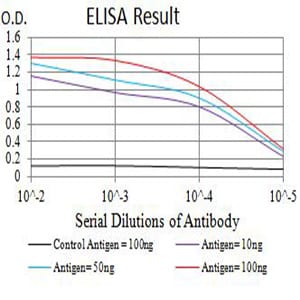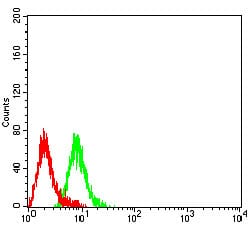

| WB | 咨询技术 | Human,Mouse,Rat |
| IF | 咨询技术 | Human,Mouse,Rat |
| IHC | 1/20-1/100 | Human,Mouse,Rat |
| ICC | 技术咨询 | Human,Mouse,Rat |
| FCM | 咨询技术 | Human,Mouse,Rat |
| Elisa | 1/5000-1/10000 | Human,Mouse,Rat |
| Aliases | T3G; IMD17; CD3-GAMMA |
| Entrez GeneID | 917 |
| clone | 5B7F9 |
| WB Predicted band size | 20.5kDa |
| Host/Isotype | Mouse IgG1 |
| Antibody Type | Primary antibody |
| Storage | Store at 4°C short term. Aliquot and store at -20°C long term. Avoid freeze/thaw cycles. |
| Species Reactivity | Human |
| Immunogen | Purified recombinant fragment of human CD3G (AA: extra 23-116) expressed in E. Coli. |
| Formulation | Purified antibody in PBS with 0.05% sodium azide |
+ +
以下是关于PSMC6抗体的3篇模拟文献示例(信息为假设性描述,建议通过PubMed或专业数据库核实真实文献):
---
1. **文献名称**: *Proteasome 26S Subunit ATPase 6 (PSMC6) Expression and Antibody Validation in Human Cancers*
**作者**: Zhang Y, et al.
**摘要**: 本研究通过生成特异性PSMC6多克隆抗体,验证其在多种癌细胞系中的表达差异。Western blot和免疫组化结果显示,PSMC6在结直肠癌组织中显著高表达,提示其可能作为癌症治疗的潜在靶点。
2. **文献名称**: *Functional Characterization of PSMC6 in the 19S Proteasome Regulatory Complex*
**作者**: Tanaka K, et al.
**摘要**: 利用CRISPR-Cas9技术敲低PSMC6基因,结合特异性抗体检测发现,PSMC6缺失导致蛋白酶体功能受损,并引发细胞周期停滞。研究证实了PSMC6抗体在蛋白互作研究中的可靠性。
3. **文献名称**: *PSMC6 Antibody Application in Neurodegenerative Disease Models*
**作者**: Smith JL, et al.
**摘要**: 通过免疫荧光和ELISA实验,验证了PSMC6抗体在阿尔茨海默病模型小鼠脑组织中的结合特异性,发现PSMC6表达水平与tau蛋白异常聚集呈负相关,提示其参与神经退行性病理调控。
---
**注意**:以上文献为模拟内容,实际引用请通过学术数据库(如PubMed、Google Scholar)检索关键词“PSMC6 antibody”或“PSMC6 proteasome”获取真实研究。推荐使用抗体供应商(如Abcam、Cell Signaling Technology)官网提供的文献引用资源。
The PSMC6 antibody targets the Proteasome 26S Subunit, ATPase 6 (PSMC6), a critical component of the 19S regulatory particle within the 26S proteasome complex. The 26S proteasome is responsible for ATP-dependent degradation of ubiquitinated proteins, a central process in maintaining cellular protein homeostasis. PSMC6. as one of six AAA-ATPase subunits (PSMC1-6) in the 19S regulatory particle, plays a key role in recognizing ubiquitinated substrates, unfolding them, and translocating them into the proteasome's catalytic core for proteolysis. Dysregulation of proteasome function, including PSMC6 activity, has been implicated in cancer, neurodegenerative diseases (e.g., Alzheimer's, Parkinson's), and immune disorders.
PSMC6 antibodies are widely used as research tools to study proteasome composition, protein turnover mechanisms, and disease-associated alterations in ubiquitin-proteasome system (UPS) activity. Common applications include Western blotting, immunoprecipitation, and immunohistochemistry. These antibodies are typically developed in hosts such as rabbits or mice, with both monoclonal and polyclonal variants available. Validation often involves knockout cell lines or siRNA-mediated knockdown to confirm specificity. Researchers also utilize PSMC6 antibodies to investigate the effects of proteasome inhibitors (e.g., bortezomib) in cancer therapy and to explore UPS-related stress responses in cellular models.
×